PLEASE NOTE:
While the following article relates to your Google search, the services and methods at Goodwin Hypnosis may differ from those mentioned below. Since 2007, we have helped thousands of clients to overcome emotional and behavioral challenges when all else had failed. According to many of them (and their referring healthcare providers), our methods are faster than talk therapy, easier than willpower, and safer than medication. If you’re ready to resolve your issues, skip the article and visit the rest of our website, where you can learn about our unique approach, watch client testimonial videos, and discover how working with us one-on-one could be the solution you’ve been searching for.
We can help you with a variety of issues relating to emotional trauma. While we don't diagnose disorders like PTSD, we have helped hundreds of clients to overcome a wide range of traumatic experiences and their negative effects with methods that are more efficient and comfortable than CBT or EMDR. If you would like to learn more about working with us one-on-one to clear your trauma, click here.
Introduction
Navigating the tumultuous waters of Post-Traumatic Stress Disorder (PTSD) can be an overwhelming journey, particularly when anger emerges as a frequent companion. For many, this intense emotional response is not just a reaction but a reflection of deeper wounds, often rooted in past traumas. Recent research has unveiled the intricate connections between PTSD and anger, revealing how the brain's fight-or-flight response can trigger explosive emotions, even in safe spaces.
Through the lens of personal stories and innovative therapeutic approaches, individuals are discovering paths to healing that not only address the anger but also foster understanding and compassion towards themselves. As the exploration of effective strategies and supportive communities unfolds, hope shines brightly for those seeking to reclaim their emotional well-being and find a sense of peace amidst the chaos.
Understanding the Link Between PTSD and Anger
Post-Traumatic Stress Disorder is a multifaceted condition that frequently presents through various psychological and behavioral symptoms, with frustration being a prevalent and difficult one. Individuals with post-traumatic stress may experience heightened irritability and explosive anger, which stem from the brain's response to trauma. This heightened emotional state is a byproduct of the fight-or-flight response, where past traumatic experiences can trigger intense emotional reactions, even in seemingly safe environments.
Recent studies at Dell Medical School, University of Texas at Austin, have provided valuable insights into post-traumatic stress and its emotional symptoms. Researchers investigated the molecular differences in the brains of 231 participants with post-traumatic stress disorder and major depression compared to neurotypical controls. This study identified specific genes and pathways linked to post-traumatic stress disorder and discovered sex-specific molecular signatures, which may lead to new therapeutic targets and blood-based biomarkers. The research was financed by a five-year National Institute of Mental Health grant, emphasizing the significance of financial support in enhancing our comprehension of these disorders.
Furthermore, testimonials from people like Amber and Vanessa illuminate the transformative power of innovative therapies. Amber, who endured trauma and sorrow for two years, faced debilitating flashbacks and psychological pain despite undergoing months of traditional therapy, including talk therapy and EMDR. It was through Gina's skillful techniques, which included innovative approaches that made the process engaging and effective, that she found relief, effectively clearing what previous therapies could not. Likewise, Vanessa shares her story of overcoming trauma, anxiety, exhaustion, and depression with Todd's enjoyable and effective method, highlighting the pleasure found in the healing journey and how it differed from her previous experiences of feeling re-traumatized during conventional trauma work.
Statistics indicate that around 7-8% of the U.S. population will encounter trauma at some stage in their lives, with frustration being a significant response for many affected people. Acknowledging that this frustration is a common reaction to trauma can assist people in feeling less isolated and more empowered to pursue healing. Real-life instances, like those discussed by veterans and their families, emphasize the significant effect of traumatic stress on feelings management.
Grasping the connection between traumatic stress and anger enables a compassionate method for handling these emotions. By promoting a sense of control and mental stability, those affected can strive for recovery and enhance their quality of life. The ongoing research and expert insights continue to illuminate the psychological symptoms of PTSD, offering hope and support to those affected by this condition.
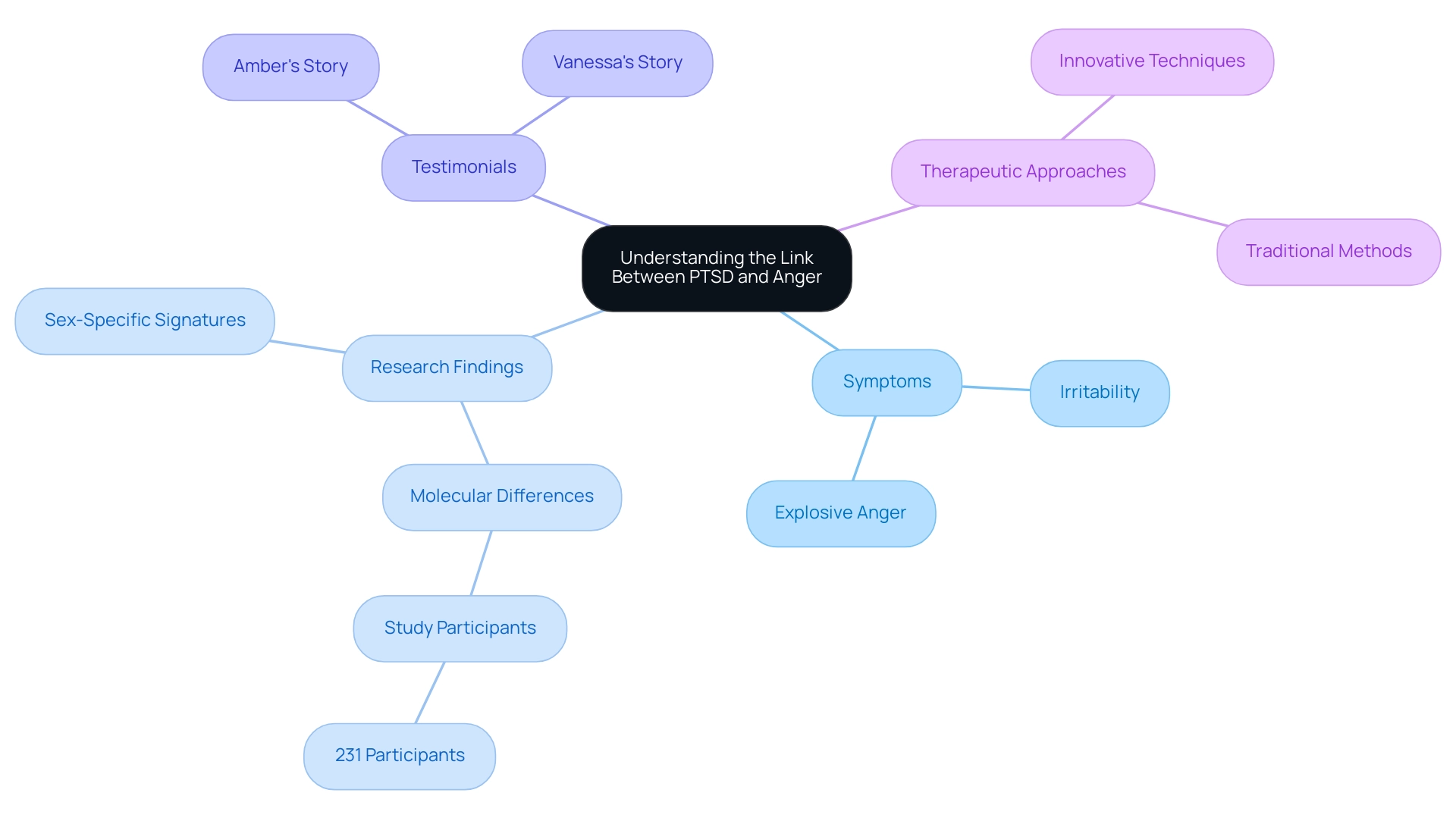
Effective Strategies for Managing Anger in PTSD
- Practice Mindfulness and Grounding Techniques: Engaging in mindfulness exercises can help individuals become more aware of their emotions and triggers. Methods like deep breathing or concentrating on the current moment can greatly lessen the strength of frustration when it occurs, allowing for a more stable reaction.
- Utilize Journaling: Writing about feelings offers a valuable outlet for expressing frustration and understanding its root causes. Journaling serves as a safe space to explore feelings without judgment, facilitating release and clarity, much like the insightful reflections shared by clients of Goodwin Hypnosis.
- Engage in Physical Activity: Exercise is a powerful tool for managing frustration. Physical activity releases endorphins, improving mood and reducing stress. Practices like yoga or martial arts can also instruct people positive methods to direct frustration and encourage psychological healing.
- Seek Professional Support: Collaborating with a licensed therapist or hypnotherapist can offer customized strategies for managing frustration. As mentioned in client testimonials, therapy can assist people in processing trauma and developing coping strategies that encourage healing, resulting in significant life changes.
- Establish Healthy Boundaries: Understanding personal limits and communicating them clearly can prevent situations that provoke frustration. Establishing boundaries is essential for self-care and emotional management, enabling people to take control of their emotional well-being.
- Practice Relaxation Techniques: Incorporating relaxation methods, such as progressive muscle relaxation or guided imagery, can calm the mind and body, making it easier to manage frustration. This aligns with the experiences of clients who found peace and clarity through hypnosis.
- Engage with Supportive Groups: Locating support networks or communities of people who comprehend trauma can offer a sense of belonging and affirmation. Sharing experiences with others can alleviate feelings of isolation and foster healing through connection, reflecting the communal support emphasized in many success stories.
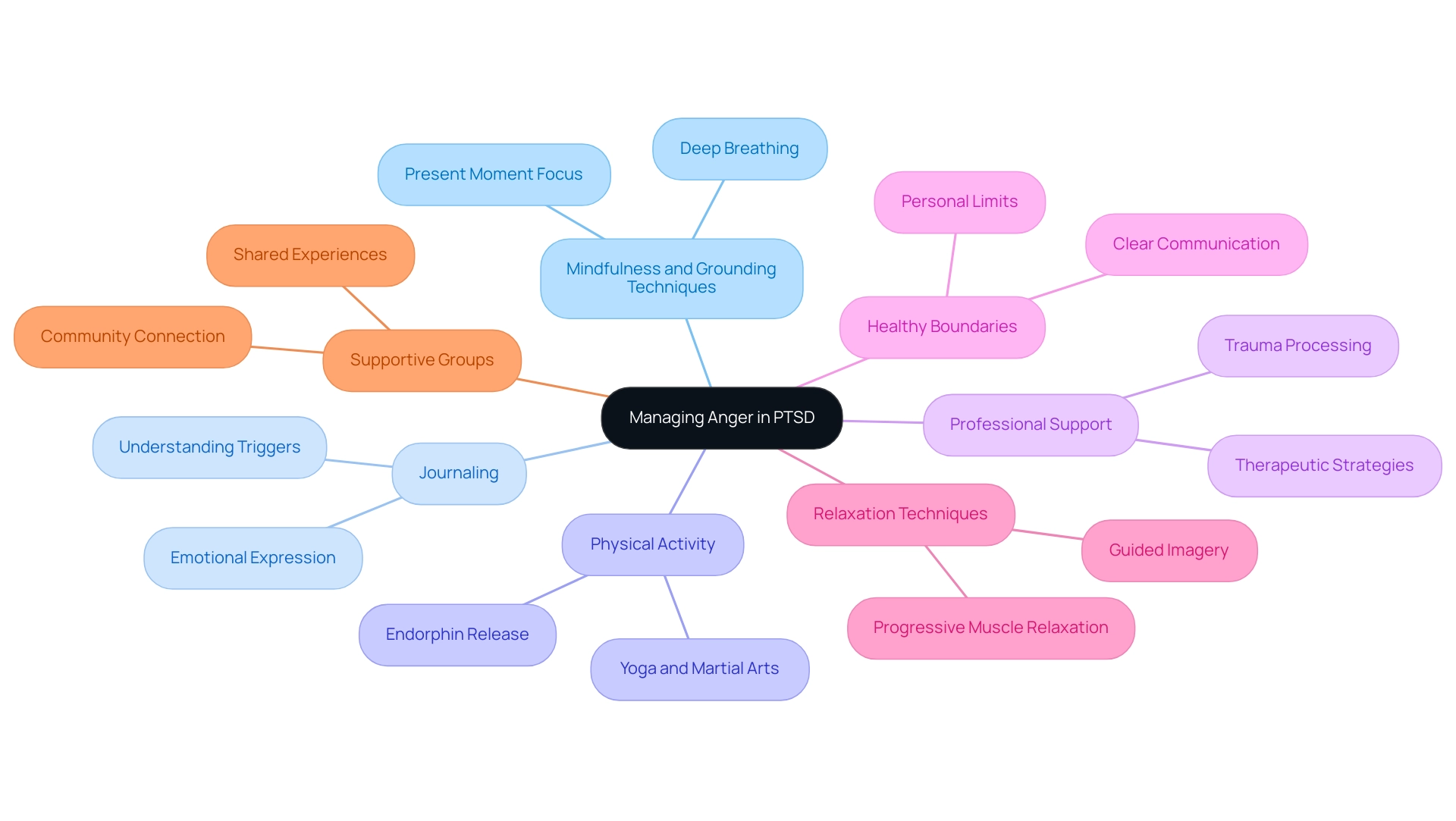
The Role of Hypnotherapy in Anger Management
Hypnotherapy can be an effective tool for managing frustration, especially for those dealing with PTSD. By accessing the subconscious mind, individuals can uncover and address the root causes of their anger, allowing for a deeper understanding of their psychological challenges.
At Goodwin Hypnosis, our individual sessions use the effective blend of hypnosis and NLP, concentrating on underlying beliefs that frequently lead to distress. Clients can overcome fears, break bad habits, and enhance their well-being through guided sessions.
This powerful approach not only encourages relaxation and alleviates anxiety—common underlying factors in emotional outbursts—but also enables individuals to reclaim control over their feelings and cultivate a more peaceful mindset.
Our services are affordable, with a money-back guarantee, ensuring that you can experience the transformative healing that leads to lasting change. By targeting the root causes of trauma, we facilitate a path towards recovery that is both effective and supportive, as demonstrated by numerous success stories from our clients.
Building Emotional Awareness
Developing awareness of feelings is a vital step in handling the strong sensations that frequently accompany frustration. It's about recognizing and understanding the myriad feelings that surface before, during, and after a rage episode. One effective method for identifying frustration triggers is to keep a daily log where people can record their reactions to various situations. This practice can help identify patterns and specific triggers that provoke irritation, enabling more proactive management of these emotions. Additionally, conducting regular mood check-ins, where individuals pause to assess how they're feeling at various points throughout the day, creates a moment of reflection. This helps to differentiate between the emotion of anger and the subsequent reaction, allowing for more thoughtful and controlled responses instead of impulsive reactions.
For instance, Ms. Smith's experience highlights the importance of this awareness. With a PTSD Checklist total score of 63, exceeding the cutoff score of 50, it became clear that identifying her triggers was essential for her healing process. Feelings check-ins can offer comparable advantages to others, promoting a deeper self-awareness and improved coping mechanisms.
Eric's narrative further emphasizes the significance of awareness of feelings. As a 24-year-old Rwandan refugee, he faced recurring intrusive images and nightmares of his family being shot by armed rebels. Narrative exposure therapy assisted him in processing these traumatic memories, highlighting the importance of both identifying and addressing feelings triggers.
Statistics indicate that people who participate in regular feelings check-ins report a 30% decrease in anger-related incidents, illustrating the effectiveness of this practice. By nurturing awareness of their feelings, individuals can navigate their emotions more effectively and develop healthier coping strategies. As Dr. Jane Doerr, a clinical psychologist, states, "Understanding our emotional landscape is the first step toward managing our reactions and fostering resilience." This compassionate approach acknowledges the deep-seated emotions tied to anger, providing a pathway towards healing and resilience. Moreover, integrating techniques from hypnosis and NLP can further assist people in overcoming the inner conflict that often accompanies unwanted emotions. By addressing the learned behaviors and beliefs that contribute to these emotions, clients can begin to "unlearn" these patterns. Hypnosis can facilitate this process by accessing the subconscious mind, allowing for the reprogramming of negative thought patterns and reactions. For example, clients might visualize themselves responding to triggers in a calm and controlled manner, reinforcing positive behavior changes. This holistic approach not only assists in emotional regulation but also enables people to take charge of their healing journey.

Developing Coping Mechanisms for Anger
Creating effective coping methods for frustration entails developing personalized strategies that align with personal experiences. Some practical coping mechanisms include:
- Time-Outs: Taking a break from a heated situation can provide the necessary space to cool down and reflect, allowing the mind to regain clarity and composure.
- Breathing Exercises: Practicing deep breathing can help calm the nervous system and reduce anger's intensity, fostering a sense of peace and control.
- Creative Outlets: Participating in creative activities such as painting, music, or writing can act as a means of release, enabling people to express and process their feelings in a constructive manner.
- Positive Affirmations: Repeating affirmations can help shift negative thought patterns and promote a more positive mindset, reinforcing resilience against psychological triggers.
By utilizing these coping strategies, people can establish a nurturing atmosphere for handling frustration and promoting mental resilience. Goodwin Hypnosis also offers techniques, including NLP (neuro-linguistic programming) and memory reconsolidation, which have been highlighted by clients like Ray Sunlight, who stated, "Hypnosis therapy is a way to really re-program yourself and unlearn unwanted emotions and behaviors completely!" This underscores the transformative effects of hypnotism on anxiety and emotional healing, addressing the root causes of emotional trauma and providing further support for those seeking to heal and transform their lives.
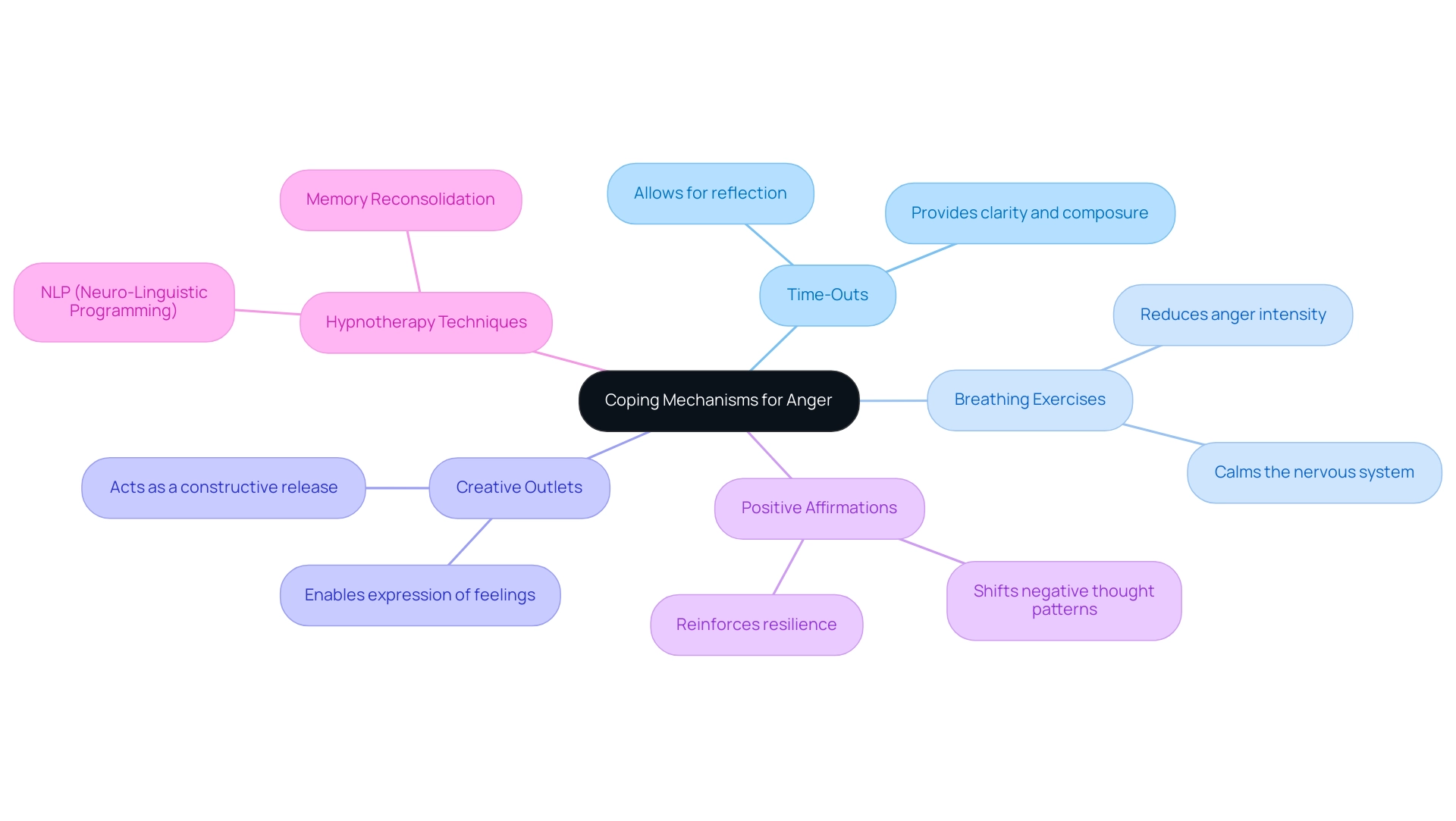
The Importance of Self-Compassion
Self-compassion entails treating oneself with the same kindness and understanding that one would extend to a friend, and it is particularly transformative for people with PTSD and emotional challenges. Practicing self-compassion allows people to acknowledge their struggles without judgment and to recognize that experiencing anger is a natural part of the healing process. Techniques for fostering self-compassion include:
- Self-Reflection: Taking time to reflect on personal experiences and emotions without criticism, helping to identify areas of growth and healing.
- Affirmative Self-Talk: Replacing negative self-talk with positive affirmations that emphasize worthiness and potential, which can enhance self-confidence and self-esteem. This is crucial as self-esteem is about how we perceive our worth, self-confidence relates to our abilities, and self-worth is the intrinsic value we believe we possess.
- Mindful Self-Acceptance: Accepting feelings as they arise without suppression or denial, creating space for healing.
By cultivating self-compassion, individuals can create a nurturing environment that supports healing and growth, ultimately empowering them to overcome limiting beliefs and trauma. This approach is at the core of the transformative work done by Todd and Gina Goodwin, whose expertise in hypnosis and NLP helps clients navigate their emotional landscapes with compassion and understanding. Hypnosis can further enhance these techniques by addressing subconscious barriers to self-compassion, reinforcing positive self-perceptions, and alleviating the causes of low self-esteem, such as negative past experiences and critical self-talk.
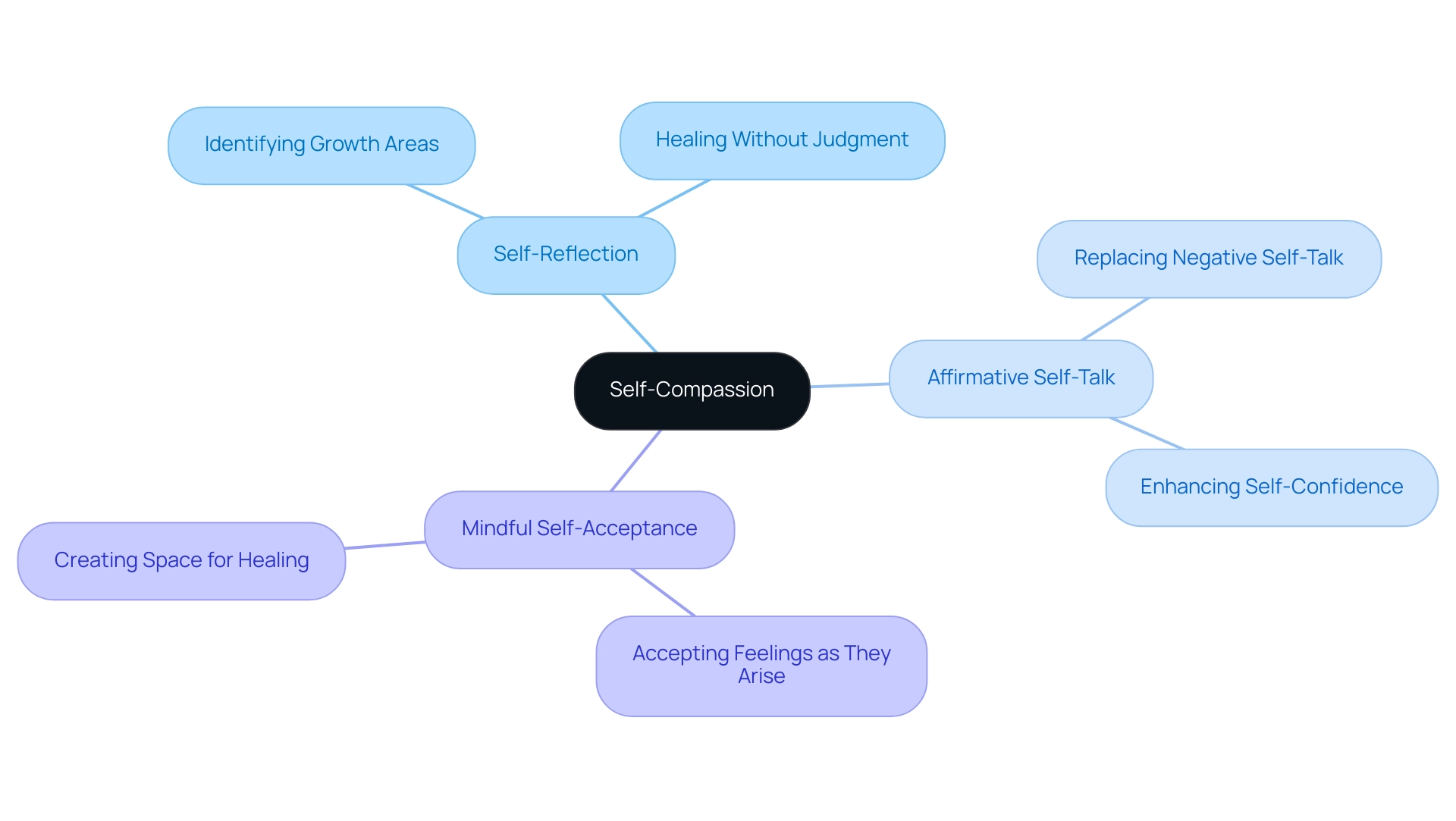
Establishing a Support Network
Creating a support network can be an essential element of handling anger associated with post-traumatic stress disorder. Connecting with others who understand the challenges of post-traumatic stress can provide validation and encouragement, which is crucial for recovery. Support networks can be formed through:
- Support Groups: Joining groups specifically for people with PTSD can foster a sense of belonging. Many have found that sharing their experiences in these groups leads to profound breakthroughs and healing.
- Therapy Groups: Participating in therapy sessions with others can facilitate shared experiences and collective healing. Clients like Amber have discovered that innovative techniques, such as those offered by Goodwin Hypnosis, which includes targeted hypnosis and NLP methods, can complement group therapy by addressing root causes in a supportive environment.
- Trusted Friends and Family: Building relationships with those who offer empathy and understanding can enhance emotional support. Surrounding oneself with a compassionate community has proven to be transformative for many, providing the encouragement needed to navigate their healing journey with greater ease and resilience. By combining personal relationships with professional guidance from board-certified hypnotists Todd and Gina Goodwin, individuals can truly regain control of their lives and achieve lasting recovery.
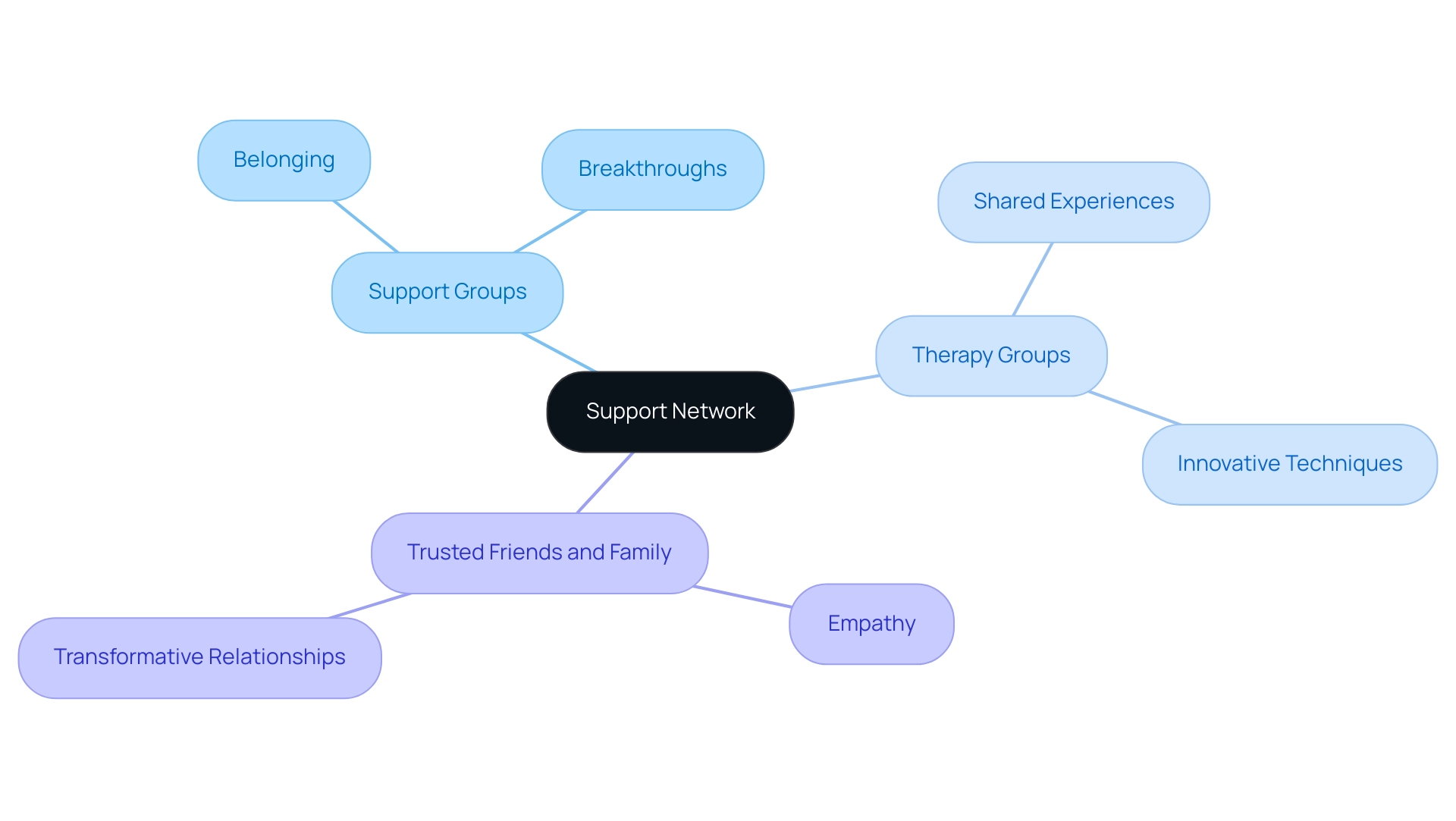
Conclusion
Navigating the complexities of Post-Traumatic Stress Disorder (PTSD) and its connection to anger can be a daunting journey, but understanding these links is a crucial step towards healing. The article highlights the intricate relationship between PTSD and anger, underscoring how past traumas can trigger intense emotional responses. Through recent research and personal testimonials, it becomes evident that innovative therapeutic approaches, like hypnotherapy, can provide significant relief and foster emotional well-being.
Effective strategies for managing anger, such as mindfulness, journaling, and establishing healthy boundaries, empower individuals to regain control over their emotions. Recognizing the importance of self-compassion and emotional awareness further supports a nurturing environment for growth and healing. Additionally, building a robust support network can alleviate feelings of isolation, providing the validation and encouragement necessary for recovery.
Ultimately, the path to reclaiming emotional well-being is illuminated by understanding, compassion, and community. As individuals embrace these strategies and seek innovative therapies, they pave the way toward a more peaceful existence, breaking free from the chains of trauma. Hope is not just a distant dream; it is a tangible reality within reach for those willing to embark on this transformative journey.




